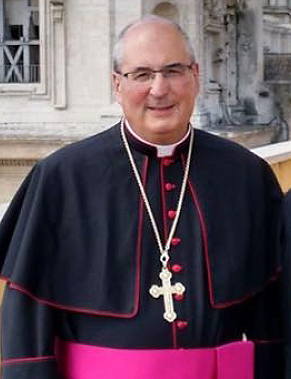
Archbishop Philip Tartaglia of Glasgow, Scotland led a series of three talks to priests of the Philadelphia Archdiocese during their biennial convocation May 30-June 1 in Hershey, Pa.
“Priestly humility has evangelical power,” Archbishop Philip Tartaglia of Glasgow, Scotland, told priests of the Archdiocese of Philadelphia during their May 30-June 1 convocation at the Hershey Lodge and Convention Center in Hershey, Pa.
“Do not underestimate the power of your priestly vocation,” he said.
The archbishop, who is president of the Scottish Catholic Bishops’ Conference and was a delegate to both the 2014 and 2015 Synods of the Family in Rome, offered three keynote presentations at the biennial gathering of archdiocesan priests.
“Human beings are instinctively religious people,” he said in his first talk, “Similarities and Differences of Catholic Life in the United Kingdom and the United States.” He emphasized that in America, “Christianity is still a living force.”
Noting the “strength and energy of the church in the United States,” Archbishop Tartaglia pointed out that “the church in Philadelphia is central to the American Catholic experience.” He urged the “very Christ-centered presbyterate” to “draw closer to the Lord.”
With regard to “Building Fraternity Within the Presbyterate,” the title of his second presentation, the archbishop insisted, “The model is always Jesus” who “appointed 12 (apostles) so that they might be with him and one another.”
[hotblock]
Priests ought to be “not just many in number and well trained, but to be united in a common faith and purpose.” Priests need “patience, perseverance and trust” to be a “bridge” between God and man, “safeguarding and protecting the grace given us” by God. “None of us is immune” to the stress, loneliness and discouragement, he continued.
“Do we pray for each other? Do we pray with each other? Are we attentive to those (priests) in need?” he asked, providing food for thought and matter for examination of conscience.
Reflecting on “Deepening our sacramental identity as priests,” his third and final presentation, Archbishop Tartaglia addressed “the priest as consecrated and set apart.” Referring to the “high priestly prayer” of Jesus at the Last Supper (John 17:1-26), the archbishop said consecration means “to be holy and set apart … for the sake of something supernatural.” He spoke of Jesus’ sacrifice on the cross as a compelling mystery and the “scandal and allure of the divine.”
While affirming priests’ connectedness with those they serve, the archbishop reminded the priests that “grace perfects nature” not “cancels or destroys” it, and he urged them “to be honest about whom we have become … grasping the fullness of what God has done through us.”
Since “we speak in a unique and formal way for the church,” he observed, “we need to proclaim what the church believes and has always believed. The central role of the priest is our service at the altar … on God’s authority, never our own.”
“Celibacy evokes curiosity and admiration,” he concluded. “We priests continue to fascinate and inspire. And that, my brothers, is a very good thing.”
In a separate session during the convocation, the theme of which was “Renewing the Vocation of the Priest in Today’s World,” Msgr. Ralph J. Chieffo, pastor of St. Mary Magdalen Parish in Media, presented a discussion on “Healing Ministry: Discernment of Spirits.”
***
Father Quindlen is pastor of Epiphany of Our Lord Parish, Plymouth Meeting.
PREVIOUS: Roman Catholic HS to expand campus with new arts center
NEXT: Getting fit with Mary by combining rosary with stretches


Humility is liberating and empowering.